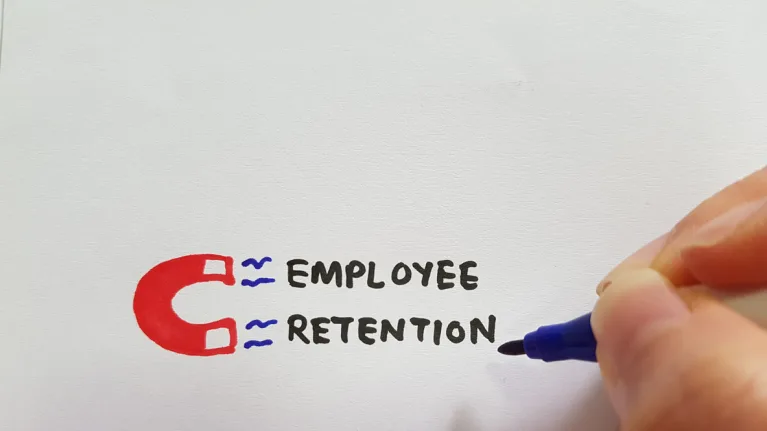Frontline Employee Retention: Strategies, Training, and Engagement
 Omer Usanmaz
·
3 minute read
Omer Usanmaz
·
3 minute read
Frontline employee retention is critical for companies across health care, retail sales, manufacturing, logistics, construction, and e-commerce. High turnover among frontline employees and frontline managers disrupts productivity, reduces job satisfaction, and undermines organizational commitment. Economic uncertainty, the Amazon Effect, and the lasting impact of the Great Resignation have intensified the need for robust retention strategies.
Investing in workplace benefits, workforce education programs, tuition assistance, debt-free education, and professional development opportunities not only strengthens employee engagement and employee well-being but also serves as a catalyst for long-term success. Qooper Mentoring Software is a proven solution to enhance frontline employee retention by providing mentoring, coaching, and structured training programs that align with career growth and talent mobility.
Empower Your Frontline Team with Structured Skill Development Template
Why Frontline Employee Retention Matters
High employee turnover rates among frontline employees increase recruitment and training costs while impacting customer experiences. Poor retention leads to burnout, disengagement, and reduced employee engagement scores, ultimately affecting team culture and organizational dynamics.
Surveys from the Bureau of Labor Statistics, Accenture, and Catalyst & Accenture show that fairness in decision-making processes, open communication channels, and effective recognition programs improve retention. Employees who feel valued and supported demonstrate higher job satisfaction, greater productivity, and stronger commitment to their companies.
How Rentokil-Terminix improved frontline employee retention and engagement with Qooper
Key Challenges in Frontline Employee Retention
Limited Career Growth and Talent Mobility
Many frontline employees face unclear career pathways, ambiguous job descriptions, and lack of internal mobility. Without professional development opportunities, reskilling, and tuition assistance, employees often seek better opportunities elsewhere.
Burnout and Workload Pressures
Frontline employees in nursing positions, retail, or gig jobs frequently experience burnout due to demanding schedules and insufficient support. Companies that fail to address employee well-being risk higher turnover.
Inconsistent Recognition and Feedback
Recognition programs, feedback cycles, and manager resources are often underutilized. Silence or lack of openness in communication can reduce engagement and compromise fairness, as highlighted by research in the Journal of Applied Psychology and Masterson & Accenture studies.
Ineffective Training and Workforce Education
A lack of structured training programs, workforce education programs, and upskilling opportunities reduces career advancement opportunities and diminishes employee engagement. Digital solutions like Qooper enable access to training opportunities anytime, supporting continuous learning and employee growth.
How Qooper Enhances Frontline Employee Retention
Mentoring and Career Pathways
Qooper connects frontline employees with mentors to provide guidance, feedback, and a clear career pathway. This structured approach empowers job-seekers and STARs to grow while reinforcing organizational commitment.
Upskilling and Workforce Education
Through structured training programs, reskilling initiatives, and workforce education programs, employees gain the skills they need for career advancement. Education benefits such as tuition assistance and student loan repayment programs further strengthen retention.
Recognition and Engagement
Qooper enables managers and leaders to implement recognition programs, track employee milestones, and use surveys to monitor employee engagement and satisfaction. Transparent communication channels foster openness and fairness, improving employee well-being and engagement scores.
Data-Driven Insights
Using analytics tools, regression analysis, and survey responses, organizations can track engagement, identify retention risks, and optimize processes. Insights from Catalyst & Accenture, ITW, and Bureau of Labor Statistics studies inform fair decision-making processes and ensure strategic alignment with employee needs.
Enhance Frontline Employee Retention with Qooper
Best Practices for Frontline Employee Retention
- Establish clear career pathways and professional development opportunities for all frontline employees.
- Implement mentorship programs to support STARs and new hires.
- Offer tuition assistance, debt-free education, and workforce education programs.
- Track engagement and retention using surveys, employee engagement scores, and analytics.
- Strengthen recognition programs and communication channels to improve transparency and fairness.
- Provide digital solutions like Qooper to integrate mentoring, upskilling, and recognition.
- Monitor turnover rates and align workforce strategies with company goals, trade policy, and operational dynamics.
Key Takeaways
- Frontline employee retention is vital for productivity, employee well-being, and organizational success.
- Career growth, workforce education, and professional development opportunities drive retention.
- Recognition programs, open communication channels, and fair decision-making processes strengthen engagement.
- Digital solutions like Qooper integrate mentoring, upskilling, and employee engagement for sustainable retention.
- Addressing burnout, economic uncertainty, and workplace dynamics is crucial for long-term workforce stability.
Conclusion
Frontline employee retention is a strategic priority for companies in health care, retail, e-commerce, logistics, and manufacturing. Investing in professional development, workforce education, reskilling, recognition programs, and mentoring improves engagement, job satisfaction, and organizational commitment.
Qooper Mentoring Software provides a comprehensive platform to implement these strategies, supporting leaders, frontline managers, and employees in building a resilient, skilled, and motivated workforce.
Request a demo today to see how Qooper can transform your frontline employee retention strategy.
FAQs about Frontline Employee Retention
1. Why is frontline employee retention challenging?
High turnover is driven by burnout, unclear career pathways, lack of recognition, and insufficient workforce education programs. Economic uncertainty and the Great Resignation exacerbate these challenges.
2. How can mentoring improve frontline workforce retention?
Mentoring provides guidance, fosters professional development, and clarifies career growth opportunities, improving employee engagement and organizational commitment.
3. What role do recognition programs play in retention?
Recognition programs celebrate milestones, reinforce fairness, and improve engagement scores, helping employees feel valued and reducing turnover.
4. How can companies measure frontline employee retention?
Using employee surveys, engagement scores, analytics tools, and regression analysis allows organizations to identify risks, track trends, and optimize retention strategies.
5. Why is Qooper an effective solution for frontline employee retention?
Qooper combines mentoring, training programs, workforce education, recognition programs, and digital solutions to enhance employee engagement, career growth, and long-term retention across frontline industries.







.png)